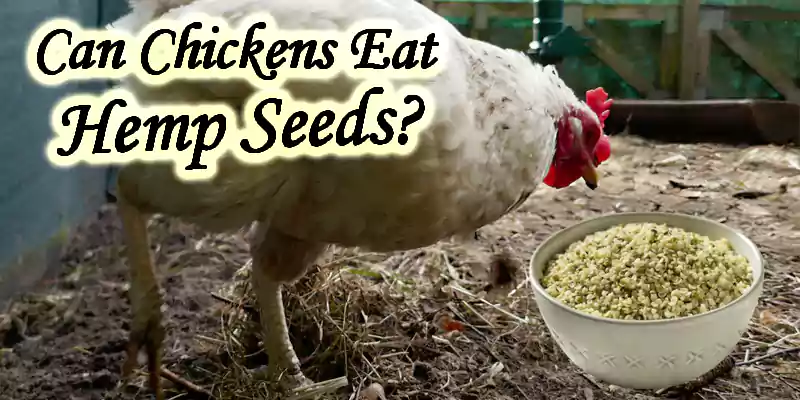Can Chickens Eat Lentils? Protect Your Flock with These Tips!
Published: 17 Nov 2024
Providing ample space to roam, fresh drinking water and a well-balanced diet are critical factors in keeping the flock healthy and happy. Some poultry keepers praise the nutritional benefits, while others express concerns: Can they enjoy a nutritious snack without risking their health?
Generally, chickens can have Lentils in moderation with proper preparation. We will dive into the details and figure out how they can be safely incorporated into their diet. We will understand the tolerable volume and frequency of serving them to the flock. We will analyze their suitability in all forms and select the best one for the flock.

Can Chickens Eat Lentils? Protect Your Flock with These Tips!
Are Lentils Bad for Chickens?
No, they are not bad for chickens if served with caution. To make them safe, we must adequately prepare them and keep their portions to a minimum. Thoroughly cooked Lentils should be preferred for the flock to prevent digestive issues. There should be no added salt or spices in cooked Lentils. Serve them sparingly and adjust the volume by cautiously monitoring the flock’s response.
Nutritional Value of Lentils
They are packed with many essential nutrients that aid chickens’ optimal growth. We are providing you with a nutritional breakdown:
- Protein Content: They provide plant-based protein, which is vital for egg production. It also supports muscle and feather growth and is highly effective for overall body repair.
- Fiber: Fiber helps improve their digestion. They have a good amount of dietary fiber. Fiber is helpful in nutrient absorption and promotes gut health in the flock.
- Carbohydrates: Lentils are rich in carbohydrates, which are a great energy source for physical activities. Carbohydrates also support metabolism and are a slow-burning energy source for the flock.
- Vitamins: They are packed with a variety of vitamins, including vitamins B, C, and K. These vitamins support metabolism, blood formation, bone health, and immune function.
- Minerals: Minerals play a vital role in the overall well-being. They offer iron, magnesium, and potassium, which aid blood formation and transportation, muscle functions, and eggshell quality.
- Antioxidants: They contain antioxidants essential for reducing oxidative stress and boosting chickens’ immune function. Flavonoids are famous for their anti-inflammatory antioxidants.
- Fats: They contain a low quantity of dietary fats. It helps to gain weight. Lower levels of fat aid in weight balance. Obesity is not suitable.
How do you Prepare Lentils for Chickens?
It is essential to prepare them before serving to the flock. It will make digestion more accessible and safer. Here is a step-by-step guide to preparing:
- Select the Right Lentils: They are available in the market with added seasonings or cooked in oils with salt and spices. We recommend avoiding using them.
- Rinse them thorouhly: The selected food must be decontaminated before being served. Thoroughly wash them under running water until the dirt is obliterated.
- Soak them: This is an optional step but has many benefits. Soaking them makes them softer. For good results, soak Them for 4-6 hours. It will also reduce the cooking time.
- Cook the Lentils: We favor cooked or boiled grains because they reduce toxicity. Take three cups of water for each cup and boil them until they become tender.
- Drain Excess Water: We advise you to drain extra water for two reasons. They do not like extra moisture, which will harden them. So, strain the remaining water.
- Let the Lentils Cool Down: Serving hot feed can cause chicken burn issues. So, don’t be careless and let them cool down to room temperature. We have to take care of their comfort.
- Clean Up Leftovers: We do not favor serving spoiled food to the flock. So, remove the uneaten leftover immediately. After sometimes, the remains will attract the pests.
- Moderation: They are beneficial as part of their routine diet. Never overfeed them, as this will result in nutritional deficiency in chickens.
How to Cook Lentils for Chickens?
Take 3 cups of water and one cup of Lentils. Boil them under low heat for 20-30 minutes. Check the softness and tenderness with your hand. If you are satisfied with their soft texture, strain extra water. Serve the boiled Lentils.
How to Sprout Lentils?
Rinse half a cup of dry Lentils under running water. Soak them in clean water for 6 hours or overnight. After draining the water, shift the soaked grains into a sprouting container. The container should have a breathable lid. Make a daily schedule of rinsing and draining the extra water, or twice daily. There will be signs of tiny sprouts in 3-4 days. After the sprouts appear, let them dry and serve to your flock.
Can Baby Chickens Eat Lentils?
No, baby chickens should not have them in their treats. They require a well-balanced diet for their optimal development. Additionally, their immature digestive system can’t tolerate a high volume of fiber and carbohydrates. We recommend serving Chicks a commercially formulated starter diet for their safe and healthy growth.
Can Hens Eat Cooked Lentils?
Yes, They can enjoy their treat with soaked or boiled Lentils. However, it is better to avoid serving raw form to hens due to the higher levels of lectins. They contain fiber, proteins, and other minerals that improve egg production. We strictly caution chicken owners to avoid adding salt and spices during cooking. Instead, serve them to hens as part of their routine diet.
Can Chickens Eat Lentils Everyday?
No, it would help if you did not serve them daily. We have recommended the occasional incorporation of the grains in moderation. Daily intake will cause digestive issues in the flock. Additionally, it will disturb the nutritional balance, which is harmful to your flock. So, serve them sparingly while preferring a nutrient-rich diet for the flock.
Conclusion
We have concluded that chickens can easily consume cooked lentils. Raw lentils contain harmful lectins which can ruin the digestive health of the flock. The cooking process will neutralize the effects of these toxic compounds and ensure the optimal growth of the clucking birds.
Lentils have some nutritional advantages, but we recommend them in a limited amount. Excessive intake will worsen the flock’s health.

- Be Respectful
- Stay Relevant
- Stay Positive
- True Feedback
- Encourage Discussion
- Avoid Spamming
- No Fake News
- Don't Copy-Paste
- No Personal Attacks

- Be Respectful
- Stay Relevant
- Stay Positive
- True Feedback
- Encourage Discussion
- Avoid Spamming
- No Fake News
- Don't Copy-Paste
- No Personal Attacks


